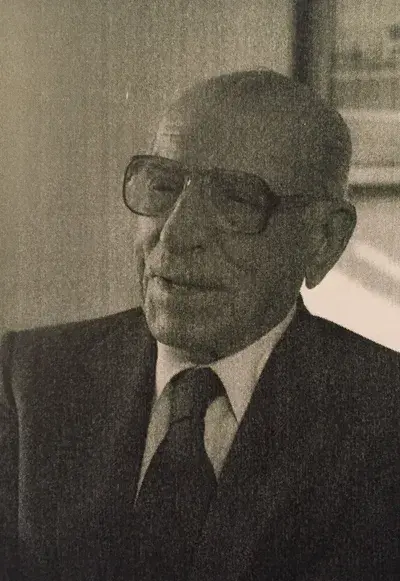The Competition Heats Up: Michigan Bean & Marketing
- Aug 20, 2023
- 4 min read

While we are still in desperate need of a qualified bean caller, we have decided to move forward with our plans anyhow and let the bean competition commence!

But first, we must dive a little deeper into the proverbial bean bag and look at Michigan Bean’s President during the late 1930s, forties and early fifties, Albert L. Riedel, the man behind the bean bunny. According to the 1953 pamphlet, “People for Better Telephone Switchbox Service,” which included an article, ‘Beans:’
Trade-mark of Michigan Bean is a bright, red jack rabbit. Home port for him is Saginaw, of course, atop their tall elevator. Like Harvey, the rabbit of Broadway fame, Michigan Bean’s jack rabbit also travels. He can be seen on grocer’s shelves all over the U.S. and his beans are frequently cooked in the soup kettles of Europeans.
The Michigan Bean Jack Rabbit logo for their consumer line of navy beans suggested an intuitive understanding of what would appeal to customers both near and far. Surprisingly, beans don’t just sell themselves.
The bean bunny was not the only Michigan Bean team member that traveled, either. A.L. Riedel took great pride in the marketing aspect of Michigan Bean and their products, traveling far and wide to investigate the advertising of other products, different potential consumer markets, and to try local foods that he might be able to spin into a new market for Michigan Bean products. One example from his travel diary entry of February 17, 1947, notes that the American South has a population they should be advertising to, specifically in the Tuscaloosa and Birmingham area. Riedel was carefully observing, seemingly always, the products available or appealing to various populations and considering how Michigan Bean’s own products could replace them.
Before his career in beans, Reidel came from humble beginnings in Minden City, Michigan, a small community in Sanilac County, part of Michigan’s thumb. Minden, which serves as home to just a few hundred people, was also the home of the Producers Elevator Company of Port Huron. It was as an organizer of Producers Elevator that Reidel made the first hop toward bean fame. He served as one of the original group of men that consolidated their localized elevators into Michigan Bean Company. At just 23 he became secretary of the conglomerate and by 27 he was the general manager and treasurer.

In 1937 Riedel became president and general manager of Michigan Bean, then headquartered in Saginaw. Under his leadership, Michigan Bean created the Jack Rabbit brand of navy beans. A marketing report put together for Michigan Bean around 1940 notes, “The Michigan Bean Company has played an important role in promoting the bean industry in virtually every market of the world.” The report goes on to state:
For years, the housewife purchased beans from her favorite grocery where they were stored in open bins and barrels, leaving much to be desired from the standpoint of cleanliness. Today, the company’s beans are found on grocery shelves in neat plastic bags, each bearing the name “Jack Rabbit.” This promotional step has taken the name of Michigan Bean Company into the homes of the company’s retail customers.
It is with these very housewives that we begin our bean competition...

The Recipe: Aunt Marie’s Baked Beans by Noreen Muellerweiss

Taken from Richland Township’s Cookbook: From Generation to Generations, a promotional product of Richland Township’s 150th anniversary celebration in 2012, the recipe notes:
This recipe was printed in the Saginaw News as a tribute to a very good cook. My Uncle Jack Murphy, a farmer in Hemlock, would grow the beans and my Aunt would put them to good use. Aunt Marie was known for bringing a large roaster pan to family gatherings, as well as innumerable funeral dinners.
2 lb dry navy beans
½ c catsup
½ c bacon drippings or lard
½ lb cut up bacon, or more if desired, or salt pork or ham
½ c brown sugar
¼ c molasses
salt and pepper to taste
Soak beans overnight, and cover the next day with water, bring to a boil. Boil beans until skins break. Drain some of the liquid from the beans and mix with the rest of the ingredients. Boil the mixture, then add the hot beans, cover and simmer for about 30 minutes. Bake at 325 degrees, and taste for doneness at various intervals. Add hot water as needed so beans have plenty of liquid and do not dry out.

Notes & Sources:

A.L. Riedel died on July 8, 1989, at 97 years old. His obituary in The Saginaw News on July 9, 1989, noted that he was a “well known Saginaw ‘Agri-Businessman,’ but he was so much more. Without Riedel and his marketing efforts, Saginaw’s bean industry may not have drawn the attention of The New Yorker’s Phillip Hamburger or, more importantly, consumers everywhere.
Special thank you to Michigan State University Archives, which hold A.L. Riedel’s and Michigan Bean’s papers, for indulging our bean exploration. For further details, see: Albert L. Riedel Papers, University Archives and Historical Collections, Michigan State University and Michigan Bean Company Records at the same institution.







![“As You Like It,” Frankfurts [Hot Dogs] Made in Saginaw](https://static.wixstatic.com/media/b166a9_1ff1c65be33c4af9987099c9837d3735~mv2.jpg/v1/fill/w_980,h_1307,al_c,q_85,usm_0.66_1.00_0.01,enc_avif,quality_auto/b166a9_1ff1c65be33c4af9987099c9837d3735~mv2.jpg)

